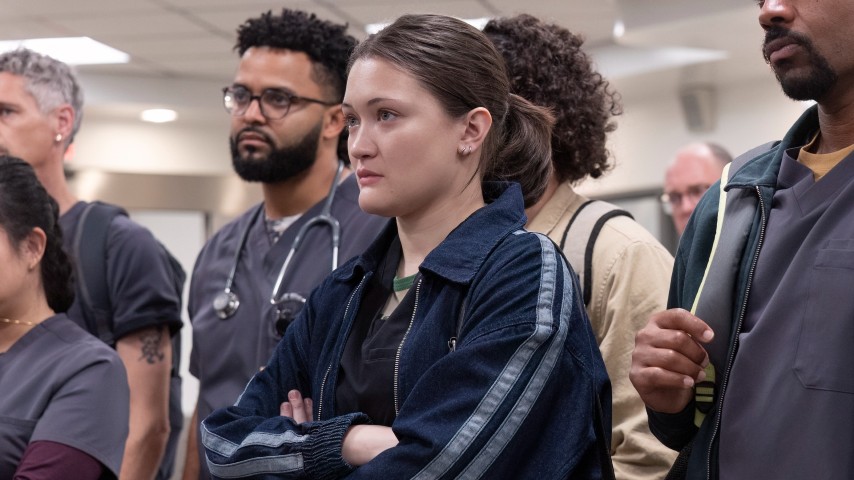This first season of The Pitt ends how it began back in January, with Dr. Michael Rabinavitch walking alone. In the premiere, he carried a determination not to be undone by the ghosts of the day his mentor died. Now, he walks away with new ghosts that—no matter how stubborn, smart, or gifted he is—he will never be able to forget.
This image is a perfect testament to everything that has made The Pitt such a reward to watch and a word-of-mouth phenomenon in a time when so many medical dramas are trying to be the next Grey’s Anatomy. The Pitt is all about the work, and the humanity of the people who do it, and not about concocting the most outlandish stories possible. And even its forays into topicality, which sadly include mass shootings and anti-vaxxers, aren’t done with preachiness.
This episode swiftly resolves the issue of McKay’s arrest, with the cops who rushed their injured colleague to the ER having a talking to with the arresting officers who decidedly cannot read a room. Instead of simply snipping a loose thread, the moment serves as a catalyst for a far richer emotional one, the wrap-up of David’s storyline. McKay explains to David that she knows what it’s like to feel misunderstood. Still, she reminds him of the very real terror that comes with being a woman in a violent world and that, even if he didn’t mean to hurt those girls, he still scarred them with fear. She’s speaking from lived experience, and her monologue offers grace and nuance to a complex situation. David may have been unfairly scapegoated for the PittFest shooting, but he still did a damaging thing—and he desperately needs help.
One of the strengths of this season is how the writers shade even the most difficult characters with hints of complexity (and without condoning destructive actions). This tendency extends to the family who refused to get their children vaccinated for measles and are now against allowing the spinal tap that would let the doctors know how to save their son. Mom is by far the shriller, more aggressive of the two parents, and her combination of ignorant obstinacy and know-it-all haughtiness is especially infuriating. Still, even she gets a very human moment, gazing down at her son and opining that he looks better—he doesn’t—in a tone that doesn’t conceal her fear.
Robby walks Dad, who seems more amenable to intervention, down the hallway. He asks him about his son and listens when he says he tries to be the father he never had, around and engaged. Then Robby opens the door to the pediatric-room-turned-morgue. The father stands before gurneys of the fallen from PittFest, with the small, bare foot of a young child poking out of a bloodied sheet. “We couldn’t save them, but we can save your son,” Robby says. The father storms out, calling Robby an asshole. “Yeah, I’m an asshole,” Robby says. “I’m the asshole who’s trying to save your son.” And he does save the son. His stunt with the father persuades the man to allow Dr. King to perform the spinal tap, even if it means going behind his wife’s back.
Though the central tension of the episode revolves around if—or, perhaps, when—Robby will succumb to the horrors of the day, all of the physicians and student doctors must find a way to live with what they’ve been through. Langdon tries to suss out what Dana may or may not have heard from Robby about him and drugs. Away from the crash and fury of triage, he’s jittery and adrift, seeking absolution from her since he knows he won’t get it from Robby. The juxtaposition of the young hotshot who can’t imagine a life away from his calling and the veteran who’s doubting hers is a powerful one—and it’s deftly played by Ball and LaNasa.
Trust Robby, she tells him. He’ll do what’s best for you. But Langdon doesn’t want to hear what Robby thinks is best for him—a 30-day inpatient stay in rehab, random drug tests, and several Narcotics Anonymous meetings per week for over a year—and erupts, saying he’s not the messed up one, Robby is. A night-shift nurse saw him in the pediatric room “talking to cartoon animals.”
Langdon may insist that he was never high at work and only medicated himself through withdrawal, but his inability to admit that it’s a problem and his impulse to cover up everything suggests that eventually he would have been dangerous tending to patients. Obnoxious though she is, Dr. Santos was right to turn him in.
Santos has been unquestionably the most polarizing figure on the show so far, and this episode does careful, sensitive work in humanizing her. While the hardass with a wounded interior would feel like a trope in other contexts, Isa Briones has added touches of vulnerability under her character’s bravado. Santos’ conversation with Max, the young man who overdosed because he “just wanted some rest,” is so impactful not because it does the heavy lifting of explaining why she’s so damn insistent on keeping everyone away from her but because it compliments what we’ve already sensed about her.
Yet there’s also a sense of catharsis in the scene, a letting go of some of that defensiveness and drive to stay safe and alone. She catches Whitaker sneaking up to some hospital dorms because he’s “between apartments” and decides to give a damn, offering him the empty bedroom in her home. Even her inflection of the nickname she gave him in episode one, “Huckleberry,” goes from taunting to affectionate.
But the most powerful full-circle moment comes with Dr. Abbott and Dr. Robby switching places during a rooftop baring of souls. After taking more misdirected venom from Jake, and having to tell Leah’s parents that their daughter is gone—brilliantly expressed in the image of a door to the family room opening and closing swiftly–Robby has finally reached that point where the only future he can see is the long way down.
Wyle and Hatosy convey so much shared history and admiration between these men as their conversation pivots from Abbott’s attempts at jokes to cowboy philosophizing. Abbott tells Robby, who is losing his fight against his tears, that he understands why he comes back every time. “It’s in our DNA,” he says. “We’re the bees that protect the hive.” The way Abbott sees it, they’re at war. And if this season has shown us anything, it’s that they are at a war—against human cruelty and stupidity, against the innate indignities of having a body, against time and death itself—and the only thing that can keep them going is the medicine.
His final affirmation for Robby is a simple: “You rocked that shit down there.” Of course, that shit down there was bringing back as many people as possible from the precipice of oblivion. No, Robby did not save Leah, or Amber, or Nick, or Dr. Adamson, but he’s saved a lot of people. And that has to count for something. It’s enough, at least, for Robby to come down and join his colleagues for beer in the park across from the hospital. The episode ends with a bittersweet toast to everyone they saved and everyone they couldn’t—and to the idea that, even if it gets this hard again, at least they have each other. They have the medicine. They’ll persevere. Because there’s nothing else. Speaking to his team during an earlier debrief, Robby himself said it best: “This place will break your heart, but it is also full of miracles.”
Stray observations
- • They caught Doug Driscoll. May they bury him under the damn jail.
- • The Whitaker-Santos roommate situation has the makings of the buddy comedy I didn’t know I needed.
- • We got to meet Mel’s sister—and her desire for both pizza and spaghetti is absolutely understandable. While it makes sense that Mel would want to watch a new movie, Elf is probably exactly what she needs.
- • Give Noah Wyle an Emmy.
- • It’s been lovely recapping this show for everyone. I’m going to miss it a lot and can’t wait for it to return.









































